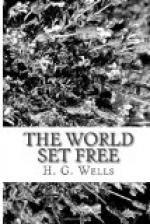Section 6
Barnet welcomed the appearance of the atomic engine with the zest of masculine youth in all fresh machinery, and it is evident that for some time he failed to connect the rush of wonderful new possibilities with the financial troubles of his family. ‘I knew my father was worried,’ he admits. That cast the smallest of shadows upon his delighted departure for Italy and Greece and Egypt with three congenial companions in one of the new atomic models. They flew over the Channel Isles and Touraine, he mentions, and circled about Mont Blanc—’These new helicopters, we found,’ he notes, ’had abolished all the danger and strain of sudden drops to which the old-time aeroplanes were liable’—and then he went on by way of Pisa, Paestum, Ghirgenti, and Athens, to visit the pyramids by moonlight, flying thither from Cairo, and to follow the Nile up to Khartum. Even by later standards, it must have been a very gleeful holiday for a young man, and it made the tragedy of his next experiences all the darker. A week after his return his father, who was a widower, announced himself ruined, and committed suicide by means of an unscheduled opiate.
At one blow Barnet found himself flung out of the possessing, spending, enjoying class to which he belonged, penniless and with no calling by which he could earn a living. He tried teaching and some journalism, but in a little while he found himself on the underside of a world in which he had always reckoned to live in the sunshine. For innumerable men such an experience has meant mental and spiritual destruction, but Barnet, in spite of his bodily gravitation towards comfort, showed himself when put to the test, of the more valiant modern quality. He was saturated with the creative stoicism of the heroic times that were already dawning, and he took his difficulties and discomforts stoutly as his appointed material, and turned them to expression.
Indeed, in his book, he thanks fortune for them. ’I might have lived and died,’ he says, ’in that neat fool’s paradise of secure lavishness above there. I might never have realised the gathering wrath and sorrow of the ousted and exasperated masses. In the days of my own prosperity things had seemed to me to be very well arranged.’ Now from his new point of view he was to find they were not arranged at all; that government was a compromise of aggressions and powers and lassitudes, and law a convention between interests, and that the poor and the weak, though they had many negligent masters, had few friends.
‘I had thought things were looked after,’ he wrote. ’It was with a kind of amazement that I tramped the roads and starved—and found that no one in particular cared.’
He was turned out of his lodging in a backward part of London.
’It was with difficulty I persuaded my landlady—she was a needy widow, poor soul, and I was already in her debt—to keep an old box for me in which I had locked a few letters, keepsakes, and the like. She lived in great fear of the Public Health and Morality Inspectors, because she was sometimes too poor to pay the customary tip to them, but at last she consented to put it in a dark tiled place under the stairs, and then I went forth into the world—to seek first the luck of a meal and then shelter.’




